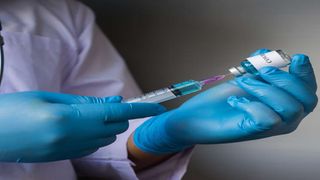
AstraZeneca expects to sell the AZD1222 vaccine at cost at about Sh327 ($3) a dose.
| File | Nation Media GroupNews
Premium
Kenyans to pay Sh327 to get coronavirus vaccine
What you need to know:
- Up to 40 frontline healthcare workers from Kilifi were involved in the joint Kemri and University of Oxford trial.
- The second phase of the trial targets 360 adult volunteers and is expected to run for months, with the volunteers drawn from as far as Mombasa.
Kenyans could pay Sh327 each to get a dose of the Covid-19 vaccine developed jointly by pharmaceutical firm AstraZeneca and the University of Oxford, the Nation has learnt.
The Kenya ChAdOx1 nCoV-19 vaccine, which is also being trialled in Kilifi County by the Kenya Medical Research Institute (Kemri), is said to protect over 70 per cent of people who use it from catching the deadly virus, as per results of the first phase trials announced yesterday. The results relate to trials conducted in Brazil and the United Kingdom.
Up to 40 frontline healthcare workers from Kilifi were involved in the joint Kemri and University of Oxford trial. The second phase of the trial targets 360 adult volunteers and is expected to run for months, with the volunteers drawn from as far as Mombasa.
“Clinical trials are also being conducted in Kenya, the US, Japan, Russia, South Africa, and Latin America, with planned trials in other European and Asian countries. In total, we expect to enrol up to 60,000 participants globally,” biopharmaceutical firm AstraZeneca said yesterday.
AZD1222 vaccine
The company expects to sell the AZD1222 vaccine at cost at about Sh327 ($3) a dose, according to reported agreements between the firm and governments and international health organisations. The other vaccines from Pfizer will cost about Sh2,180 ($20) a dose, while Moderna’s is priced between Sh1,635 ($15) to Sh2,725 ($25); based on agreements the firm has struck with the US government. However, all these three vaccines must be approved by regulators before they are administered.
The Kenyan Ministry of Health will also make evaluation of the vaccines. Health Cabinet Secretary Mutahi Kagwe last week told the Nation that the government has not made a commitment to take any vaccines.
“We will explore all options,” Mr Kagwe said.
On Monday, Health Director-General Patrick Amoth told the Nation that “we could easily enter into a bilateral partnership with Astra Zeneca to get more doses as this vaccine was very promising because it shows protection against all age groups and could also stop transmission of the virus.”
This will be good news for Kenya, which has been sitting on the sidelines after it emerged that the logistical nightmare of handling the first two vaccines announced by Pfizer/BioNTech and Moderna were out of reach for the country.
On Monday, AstraZeneca said it has agreed to sell it at cost to developing nations in perpetuity.
Multilateral organisations
“AstraZeneca continues to engage with governments, multilateral organisations and collaborators around the world to ensure broad and equitable access to the vaccine at no profit for the duration of the pandemic,” the firm said.
Professor Andrew Pollard, Chief Investigator of the Oxford Vaccine Trial, said “these findings show that we have an effective vaccine that will save many lives”.
“Excitingly, we’ve found that one of our dosing regimens may be around 90 per cent effective and if this dosing regime is used, more people could be vaccinated with planned vaccine supply,” he said.
“The vaccine’s simple supply chain and the firms no-profit pledge and commitment to broad, equitable and timely access means it will be affordable and globally available, supplying hundreds of millions of doses on approval,” said the firm’s Chief Executive Officer Pascal Soriot.
This is the news that Kenya and other developing countries have been waiting for. Unlike the first two vaccines that require a storage temperature as low as -70 degrees Celsius, a logistical nightmare for Kenya, the AstraZeneca vaccine “can be stored, transported and handled at normal refrigerated conditions (2-8 degrees Celsius) for at least six months and administered within existing healthcare settings.”
But even as the country lines up with the rest to receive the vaccines next year, the US and India are leading in their orders for the AstraZeneca vaccine, making one third of the 3.2 billion doses ordered. The US has also ordered 200 million doses of Moderna and Pfizer vaccines.
The European Union has ordered 400 million doses of the AstraZeneca vaccine, 300 million doses of the Pfizer, and 75 million doses of the Moderna doses.
Japan is third with 125 million doses each for the AstraZeneca and Pfizer vaccines, and 50 million doses of the Moderna vaccine. Brazil, United Kingdom, Australia, and Canada are the other countries that have ordered millions of doses of the three vaccines. Only Egypt, in Africa, has made an order for the Covid-19 vaccines.
Additional reporting by Vera Okeyo.





